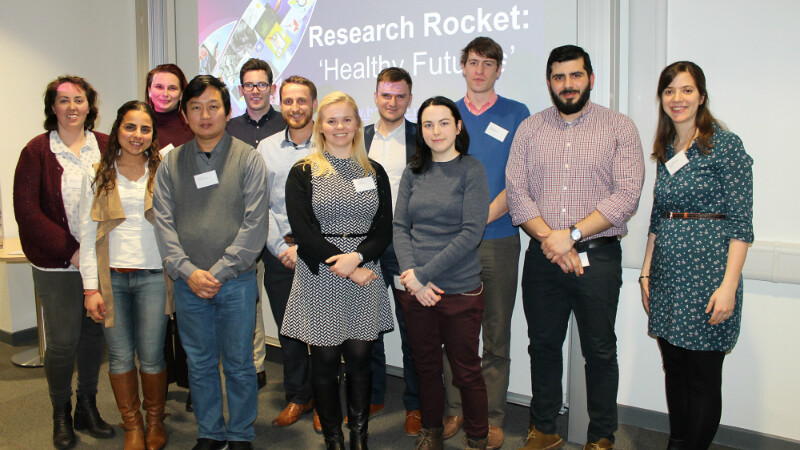This year’s Research Rocket was a celebration of the contributions our early career research community are making and a welcome to all those who have joined us in recent months.
Themed around ‘healthy futures’, drawing in contributions from our early career researchers, from doctoral students to lecturers, and from right around the University, the event took place in 10W, home of our new Graduate Commons.
Presenters were each tasked to deliver a six-minute elevator pitch, setting out their research and why it matters, their motivations for doing it, where they are on their research journeys and their advice to others.
Chair for the event, Pro-Vice-Chancellor (Research) Professor Jonathan Knight said: “We heard a series of fascinating talks from our early career researchers showcasing how and why their work is contributing to delivering healthy futures. What struck me was the links between many of the projects they spoke about, and an underlying message about collaboration and cooperation between different parts of the University and with partners. I was really impressed by the lessons they drew from their experiences which constituted excellent advice to a researcher at any career stage.
“This is an exciting time to be part of the University as an early career researcher. We’re enhancing the support structures in place for doctoral provision to ensure those completing a doctorate with us have the best possible experience. Events like Research Rocket are a good chance to shine the spotlight on their work.”
We heard from:
Rhiannon Edwards (PhD Department of Psychology), who described her work on pain communication and how an individual’s sex affects how they report pain. Up to 40% of people in the UK are in persistent pain, so understanding more about the mechanisms behind it has important implications for healthcare services.
Marcus Johns (PhD Department of Chemical Engineering, Centre for Sustainable Chemical Technologies) works on tissue engineering and developing new components for organs such as the heart. Marcus’ own tricuspid valve in his heart is not properly formed, and by sharing his own story and motivations behind his work, he pointed to the huge, potential applications for this work in improving quality of life for patients.
Dr Theresa Smith (Department of Mathematical Sciences) is an epidemiologist using statistics to map particular healthcare challenges. Her presentation focused on the spread of Campylobacter – one of the most common gastro-intestinal bugs – and her studies of what was happening from analysis of the cases in North East England.
Dr Neo Stylianou (School of Management) is a research associate who worked as Researcher-in-Residence at the RUH. Neo’s past work looked at prediction modelling for emergency services, association of medical outliers with patient outcomes and looked into maternity care provision. His current project is focused on what-if scenarios and best treatment routes for Atrial Fibrillation patients.
Dr Naing Thet (Department of Chemistry) spoke of his work as part of the Jenkins Biophysical Chemistry Research Group in developing smart wound dressings that detect infections, in particular for burns injuries in children. This work has received widespread attention in recent years and is currently at clinical trial stage.
Harriet Carroll (PhD Department for Health, SW DTC) is focused on nutrition with a particular interest in understanding the role of breakfast and hydration status on blood sugar control and appetite regulation. Harriet’s talk described the test her team completed to understand the effect of hydration status on metabolic health.
Dr Despina Moschou (Prize Fellow, Department of Electrical & Electronic Engineering) is trying to use advanced microchip technology to impact future healthcare with biomedical diagnostics. There is a lot of movement in this area currently and a huge potential for this work, yet the challenge for researchers remains bringing it all together at an affordable budget.
Marianna Frangeskou (PhD, Management) is also a researcher-in-residence at the RUH. Her work looks at improving the efficiency of patient journeys through a hospital – in particular the acute stroke care pathway. She has highlighted the challenges that exist with this, but also some simple, cheap, solutions that could improve care for patients and save the NHS money.
Simon Vanstone (PhD, Department of Physics, and Department of Pharmacy & Pharmacology) looks at nail disease and the difficulties that persist in targeting drug therapies through nail to treat it. As the nail is such an effective natural barrier, topical treatments are often ineffective. Simon has worked on a project using a laser to drill minute holes in the nail surface to improve delivery rates.
Dr Tom Curran (Department for Health) focuses on the relationship between perfectionism and mental health. Perfectionism is on the rise among young people in particular, and it is becoming more debilitating. Tom’s work is shining a light on the issue and raising the topic among the wider public.
Olivia Cooke (Department of Architecture & Civil Engineering, WISE CDT) focuses on storm water run-off in slums in South Africa. With water-borne diseases a major health problem in these areas, Olivia has worked with our international partners at Stellenbosch to understand more about water quality in these areas with a view to developing cost effective interventions that could improve future irrigation and sanitation.
Dr Lukasz Piwek (School of Management) is a Lecturer in Data Science and working on multiple projects around future healthcare, fitness wearables and apps. Lukasz’s background is in psychology and his talk explored how such apps can help deliver personalised healthcare, encouraging individuals to take targeted action to beat high blood, high cholesterol and to tackle physical inactivity.

